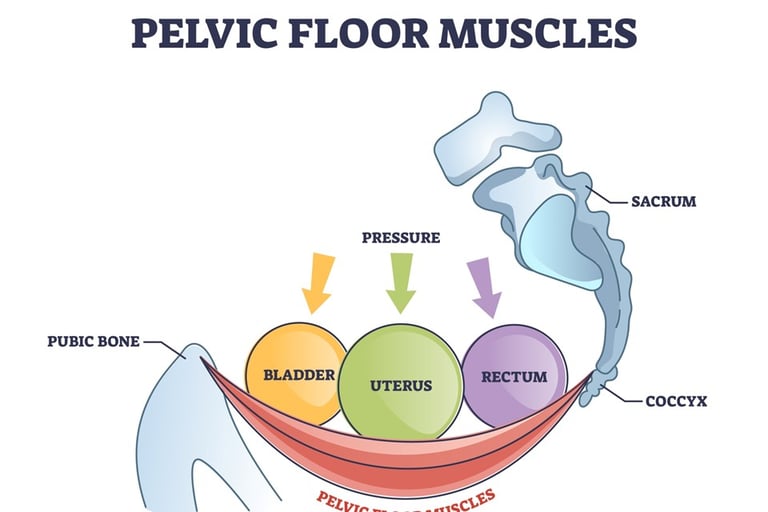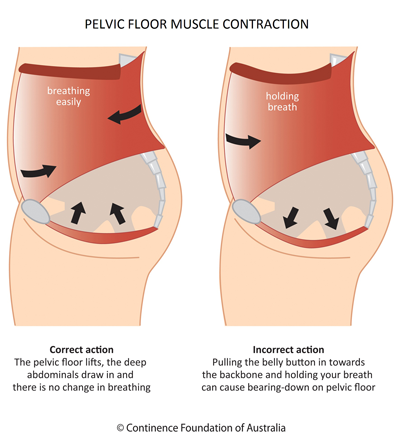Book Online! Email: info@physiokaty.com Phone: 07496 981438
Pelvic Floor Problems
Your pelvic floor is more than just muscles – it's the foundation for your core strength and overall well-being. Imagine a complex sling made of muscles, fascia, and ligaments. This amazing structure stretches from your pubic bone to your coccyx, silently supporting your bladder, uterus, and rectum throughout your life.
Unfortunately, the pelvic floor can weaken due to various reasons throughout your life – especially if you have children, but as well if you regularly strain on the toilet, have a chronic cough or your BMI is too high. Pelvis-related conditions are thought to affect as many as 25% of women at some point in their lives, often during and after childbirth, when the pelvic muscles are placed under increased strain from changing hormones, extra weight and the stress of labour. You may also develop pelvic floor dysfunction due to trauma, surgery, or muscle overuse.
Physio Katy in Beckenham offers specialised physiotherapy treatments for common pelvic floor problems. These issues can cause a variety of unpleasant symptoms like incontinence, reduced bowel control, back pain, and even a loss of sexual sensation.I design personalised pelvic floor physiotherapy programs specifically for you. These programs will help you to reduce your symptoms, improve your functionality and prevent future problems.
Common Pelvic Floor Issues;
Lack of bladder or bowel control
Pelvic Pain
Overactive or underactive bladder
Painful intercourse
Urinary Incontinence
Urinary incontinence is when you have trouble controlling your bladder, allowing wee to leak out. It is estimated it affects 40% of all women, with a high-risk time being after childbirth. It can be frustrating and affect your daily activities. But the good news is, with understanding and proper treatment, you can regain control of your bladder.
Why Does This Happen?
There are two main reasons why you might experience incontinence after childbirth:
Weakened Pelvic Floor Muscles: During pregnancy, your growing uterus puts pressure on your pelvic floor muscles, which support your bladder and urethra. Childbirth, especially vaginal delivery, can further weaken these muscles, leading to leaks.
Hormonal Changes: Pregnancy hormones can affect bladder function, making it more sensitive or irritable.
Types of Incontinence:
There are three main types of incontinence, each with different symptoms:
Stress Incontinence: Leaks occur during activities that increase pressure on your bladder, such as coughing, sneezing, laughing, or exercising. One of the causes of stress leakage is poor control of already weak pelvic floor muscles.
Urge Incontinence: You experience a sudden and strong urge to urinate, making it difficult to reach the toilet on time. There are several reasons why this happens - drinking fluids that irritate the bladder, such as fizzy drinks, caffeine or citrus, or because you are not drinking enough fluid through the day. It can also be a result of lost or reduced control of the bladder muscle.
Mixed Incontinence: A combination of stress and urge incontinence.
Treating Urinary Incontinence
As a physio, I know the bladder does not work alone and its function is affected by various other parts of the body like surrounding muscles, organs sitting nearby, constipation, psychological influences and bladder and bowel habits.
At Physio Katy in Beckenham, I am experienced in assessing the extent of the damage, then sharing safe yet effective exercises that will strengthen your pelvic floor muscles and release tension in the area that could be exacerbating symptoms. I will help you to understand what factors might be influencing your symptoms and support you with various treatment techniques that may include:
Teaching healthy bladder and bowel habits
Bladder training support.
Bladder diary review and advice on bladder irritants.
Pelvic floor internal assessment and treatment
Lower abdominal and core exercise
Teaching effective pelvic floor exercises (they are so often done incorrectly!)
Visceral manipulation




Cancellation Policy
Please note there is 100% charge on appointments cancelled within 48 hours. This fee applies to all patients, including those with insurance. Insurance companies will not be billed for missed appointments. The patient will be responsible for the fee.
Payment
We accept all major debit/credit cards and bank transfers as forms of payment.
Insurance
If you have a health insurance company that allows cash back on your claims, you are welcome to book in, pay up front and then use an itemised invoice and receipt to claim back the cost of your appointment.
Physio Katy
Breeze Yoga 9 Albemarle Rd Beckenham BR3 5HZ
We are located within Breeze Yoga in Beckenham, easily accessible from Beckenham Junction Station
